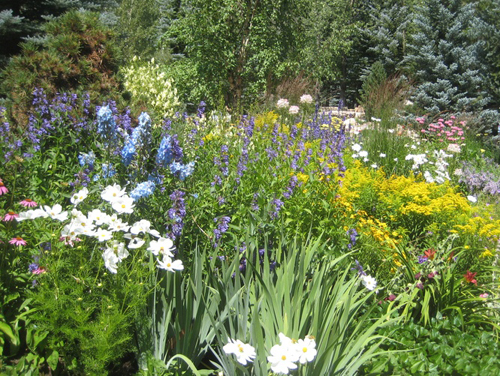High Country Gardening
The
key to successful gardening in higher elevations is working with the elements
(sun, wind, soil, and cold and accounting for the way the elevation affects
your growing season.
Soil
Prep- A High Priority
In most areas of our Rocky Mountains, soil is not soil at
all, but mainly decomposed granite. To compensate for this, add Ferti-lome sphagnum
peat moss to new beds and work it into existing beds as part of spring
cleanup and planting. Start with 3 inches of sphagnum peat moss over
an area and work it down as far as the rocks in the area permit
(hopefully 8-12 inches deep). Then as you actually plant add Nature's
Yield Compost to the area in a ratio of 1/3 compost to 2/3 soil.
The
Elements Can Help
In many ways gardeners at higher elevations have an advantage over their
metro-area counterparts. Snow is not always an enemy. Once
snow arrives in the mountains, it generally stays until spring and acts
as an insulator, protecting plants from an otherwise harsh environment. Cooler summer temperatures can be used to one's advantage. Mountain
gardeners can enjoy snow peas and broccoli all summer long. Root
plants like carrots, potatoes, or radishes do well in the vegetable garden. You may need to protect heat-loving plants like tomatoes with a protective
enclosure.
High Country
Friendly Blooms
It
is truly amazing how many types of plants can be utilized in mountain gardens
and landscapes. For example, many varieties of perennials do well
in mountain settings because they die back to the ground each fall and are not affected by the elements in winter. Mountain gardeners
should select perennial varieties that bloom in early to mid-summer.
Late bloomers, good at lower elevations, will get caught by early fall mountain
freezes. Brown-eyed Susans, painted daisy, yarrow, sunflowers, and
columbine can be seeded or planted in gardens or natural areas.

Bearded
iris and Siberian iris make showy beds of blooms. Tiger lilies, oriental
poppies, pansies, sweet peas, hollyhock, gaillardia, and sweet William
top the list for showy mountain blooms.
Don't overlook roses. Grafted roses
may not be winter hardy over 6500' and should be treated as an annual in the
mountains. Look for roses
grown on their own roots including miniature roses and Rugosa roses. The Canadian, Parkland, and Explorer series also do well. It is important
to follow instructions on winterizing your roses by protecting canes and
roots from cold temperatures.
Shrubs that
Shrug off the Cold
There
are many shrubs that do well in a mountain landscape. The curlleaf
mountain mahogany is a native evergreen and has a beautiful upright shape. It sports attractive seed heads in late summer. The tiny trumpet
honeysuckle would make a nice addition to a mountain landscape. It
offers showy, fragrant, reddish-pink trumpet-shaped flowers for many weeks
in the summer.
One
of our favorites is the serviceberry bush. It offers beautiful white
flowers in the spring, followed by edible fruit (serviceberries)
the service berry bush also provides fall color in shades of oranges and
yellows. The red twig dogwood provides a showy red contrast against
winter snow banks. It grows to a height of 3 feet with a spread of
3 feet.
The Apache plume is a native shrub with a white flowers similar to that
of a rose. These are followed by feathery, rose colored seed tails. Planted against a dark background, the Apache plume's white stems are striking. Often overlooked and many times hard to find, the Russian hawthorn is a
small tree (or large shrub). The Russian hawthorn sports yellow to
orange fall color and provides food for the birds in the winter. The beautiful
cinnamon bark of the native river birch
gives the tall shrub an interesting winter texture.
The lingonberry, an evergreen 4 to 8 inches high is rated to zone 2 and
ideal for a part shade border. This shrub is self pollinating and
its berries are great for jams, jellies, and sauces.
Wild Cranberry? Yes. This conversation
piece grows to zone 3 and is evergreen. The wild cranberry has delicate
foliage followed by edible berries in the fall.
Echter's can connect you to professional
landscape design services for a detailed landscape plan or on-site consultation
in the Denver Area.